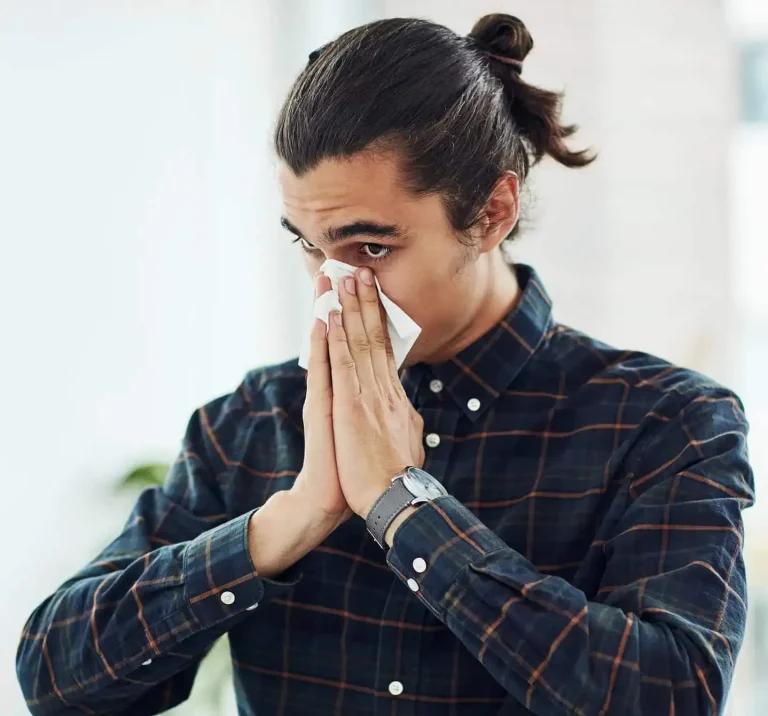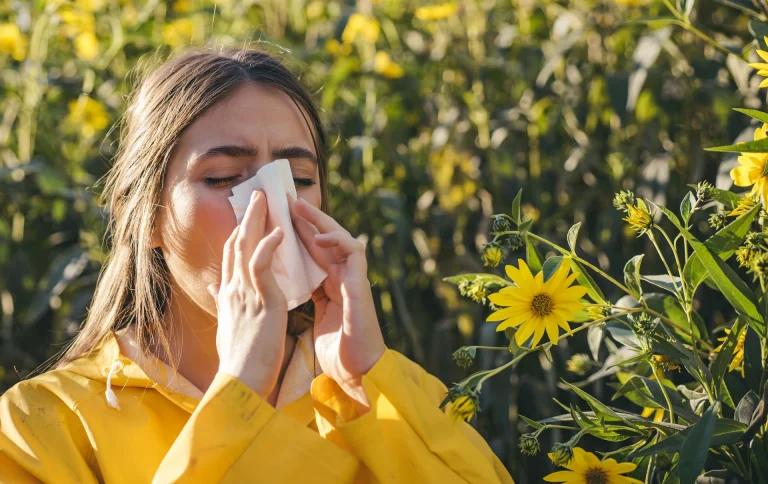Hay fever, also known as seasonal allergic rhinitis, is a common condition that affects millions of people worldwide. While the primary symptoms of hay fever – sneezing, a runny nose, and itchy eyes – are well-known, many individuals with this condition also experience an unexpected side effect: Pollen-food allergy syndrome (PFAS), also called oral allergy syndrome. This phenomenon occurs when the immune system mistakes certain raw fruits, vegetables, and nuts for the pollen that triggers hay fever, leading to unpleasant and sometimes dangerous reactions. Understanding the connection between hay fever and PFAS, as well as identifying the specific foods to avoid, is crucial for managing both conditions effectively.
What is the pollen-food allergy syndrome?
Pollen-food allergy syndrome is a type of food allergy that arises due to cross-reactivity between pollen and certain plant-based foods. When individuals with hay fever, caused by birch, ragweed, or grass pollen, consume raw fruits, vegetables, or tree nuts, their immune system recognizes the proteins in these foods as similar to the pollen they are allergic to. This triggers an allergic reaction, typically showing allergy symptoms such as itching, tingling, or swelling in the mouth, lips, and throat.
The reason PFAS is more common in older children, teens, and young adults is that younger children under the age of 3 usually do not develop hay fever until later in childhood. As they grow older and their pollen allergies become more established, the cross-reactivity with certain foods becomes more pronounced.
Identifying the culprit foods
The specific foods that can trigger PFAS symptoms depend on the type of pollen allergy a person has. The proteins in foods, particularly fresh fruit and fresh vegetables, resemble pollen, and so the body reacts accordingly. Those with birch pollen allergies, for example, may experience reactions to apples, carrots, celery, fennel, cherries, hazelnuts, and peaches, among others. Individuals with ragweed pollen allergies may react to melons, watermelons, bananas, cucumbers, zucchini, honey, chamomile tea and sunflower seeds. Grass pollen allergy sufferers may find that citrus fruits, tomatoes, and kiwis can cause issues.
It’s important to note that not everyone with a pollen allergy will necessarily develop PFAS, and the severity of the reactions can vary. Some people may be able to tolerate certain foods in cooked or processed forms, as the heating process can alter the allergenic proteins. However, for those who do experience PFAS, avoiding the problematic raw fruits, vegetables, and nuts is generally helpful.
Symptoms of pollen-food allergy syndrome
The most common symptoms of PFAS are localized to the mouth and throat, including:
- Itching or tingling of the lips, tongue, and throat
- Swelling of the lips, face, or throat
- Hoarseness or difficulty swallowing
- Nasal and eye irritation, such as itching or redness
In rare cases, PFAS can progress to a more systemic reaction, with symptoms like hives, nausea, or even anaphylaxis. Individuals who have experienced severe reactions or have a history of pollen allergies to high-risk foods like peanuts or tree nuts may need to carry an epinephrine auto-injector as a precaution.
Diagnosis and testing for PFAS
Diagnosing pollen-food allergy syndrome typically involves allergy testing and taking a patient’s medical history. The allergist will assess the individual’s pollen allergies and then test their reactions to various raw fruits, vegetables, and nuts to identify the specific triggers.
In some cases, an oral food challenge may be performed, where the patient is gradually exposed to the suspected allergen under close medical supervision. This can help confirm the diagnosis and determine the severity of the reaction.
Managing pollen-food allergy syndrome
The primary management strategy for PFAS is avoidance of the problematic raw foods. This may involve peeling or cooking the offending fruits and vegetables, as the heating process can often alter the allergenic proteins and make them less likely to trigger a reaction.
For individuals with severe PFAS symptoms or a history of systemic reactions, the allergist may prescribe an epinephrine auto-injector to be used in case of an emergency. In some cases, the allergist may also recommend allergy immunotherapy, or “allergy shots,” to help desensitize the patient to the pollen allergens and potentially reduce the cross-reactivity with foods.
Navigating seasonal allergies and PFAS
Dealing with the dual challenges of hay fever and pollen-food allergy syndrome can be daunting, but with the right knowledge and strategies, individuals can find relief and manage their symptoms effectively.
It’s important to work closely with an allergist to identify the specific pollen and food triggers, develop a comprehensive management plan, and stay vigilant about avoiding problematic raw foods, especially during peak pollen seasons. By understanding the connection between hay fever and PFAS, individuals can take proactive steps to minimize discomfort and enjoy a better quality of life.
Coping with hay fever and PFAS
Living with hay fever and pollen-food allergy syndrome can be a daily challenge, but there are strategies to help manage the symptoms and maintain a good quality of life:
- Stay informed about pollen counts and forecasts, which can help individuals plan their activities and dietary choices accordingly. Apps and online resources can provide real-time pollen data, allowing hayfever sufferers to be better prepared
- Maintain good nasal hygiene, such as using saline rinses or nasal sprays, to help clear out pollen and reduce inflammation in the sinuses. Over-the-counter antihistamines and decongestants can also provide relief for hay fever symptoms
- For those dealing with PFAS, being vigilant about reading food labels and inquiring about ingredient lists when dining out is crucial. Carrying an epinephrine auto-injector can also provide peace of mind for individuals with a history of severe reactions
- Incorporating stress-reducing activities, such as meditation, yoga, or gentle exercise, can also help alleviate the overall burden of hay fever and PFAS. By adopting a holistic approach to managing these conditions, individuals can find ways to thrive and enjoy their lives despite the challenges
Seeking professional guidance
While managing hay fever and pollen-food allergy syndrome can be done to some extent through self-care and avoidance strategies, it is highly recommended to work closely with an allergist or immunologist. These medical professionals can provide comprehensive diagnosis, personalized treatment plans, and ongoing support to help individuals better navigate their allergies.
Allergists can conduct the necessary testing to identify the specific pollen and food triggers, as well as determine the severity of the reactions. They can then advise on the most appropriate management strategies, such as the need for epinephrine auto-injectors, allergy immunotherapy, or dietary modifications.
Conclusion
By understanding hay fever and pollen-food allergy, identifying the specific trigger foods, and working closely with medical professionals, you can develop effective strategies to manage both conditions and minimize the impact on daily life. Remember, while hay fever and PFAS can present significant challenges, there are ways to find relief and maintain a positive outlook.
Sources
- Oral Allergy Syndrome | Symptoms & Treatment – ACAAI Public Website
- Pollen-Food Allergy Syndrome (for Parents) – Nemours KidsHealth
Medical Disclaimer
NowPatient has taken all reasonable steps to ensure that all material is factually accurate, complete, and current. However, the knowledge and experience of a qualified healthcare professional should always be sought after instead of using the information on this page. Before taking any drug, you should always speak to your doctor or another qualified healthcare provider.
The information provided here about medications is subject to change and is not meant to include all uses, precautions, warnings, directions, drug interactions, allergic reactions, or negative effects. The absence of warnings or other information for a particular medication does not imply that the medication or medication combination is appropriate for all patients or for all possible purposes.







